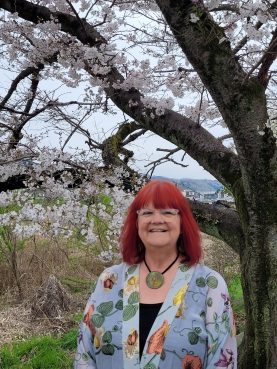Welcome to Tina MacDonald Counselling
A confidential space to explore thoughts, feelings and challenges
Short and long term counselling for individuals where curiosity around change and a new perspective happen.
Welcome, and thank you for visiting Tina MacDonald Counselling.
I have over 30 years as a business manager so I understand the importance of self-care and stress management. My counselling training involved generic short term counselling and I have worked and volunteered with a project providing long term counselling for survivors of childhood sexual abuse.
My private practice benefits from my experience with short and long term therapy. My pluralistic values help tailor client sessions through discussion for each persons individual requirements.
I enjoy hill walking with family. I am originally from Cornwall and I love being by the sea. There is nothing better than meeting friends and sharing laughter over a coffee or a relaxing lunch.

Speak in confidence
Counselling takes place in a safe space, where you can meet with someone who will listen with sensitivity and empathy - and without judgement. In the therapy space thoughts and feelings can be expressed freely and in confidence.
Together we can...
Counselling gives us a better understanding of where our issues might generate from. Often deciding we would like a different perspective can allow us to accept the need for change. Helping you to understand why you react in the way you do and working together exploring better, healthier choices for moving forward. Change happens when you engage with the small steps towards it.
Client base includes
Kirkcaldy, Fife, Dundee & Tayside, Perth, Edinburgh & The Lothians, Glasgow & Strathclyde, Highlands & Islands, Devon & Cornwall, The Home Counties and many more!
Pluralistic Counselling
I am a pluralistic counsellor and work across all theories. Pluralism believes that no two people are alike. No single event affects different people in the same way or no single event will have the same effect at different times in your life. Therefore why should one theory suit all clients. As a talking therapy pluralistic practice changes and adapts to support the needs of each unique person. Valuing my clients as the expert on their own life story I offer a non-judgemental space while looking at all resources available to them at a pace that suits. Empathy applied to goals of counselling put the client at the front of decisions and choices to allow our therapeutic relationship to broaden options.
What issues can counselling help with?
People come to counselling for help a wide range of issues. These are just some of the issues that I can help you with. Please contact me to discuss other issues concerning you.
Feelings of stress or anxiety
Panic attacks
Relationship problems
Grief, loss or bereavement
Problems with addiction
Trauma and post-traumatic stress
Abuse
Depression
Problems with confidence or self-esteem
Anger management
Issues relating to sexuality
Difficulties at work or in retirement
Relationship issues
Childhood trauma
Childhood sexual abuse
Qualifications
- Certificate in Counselling skills – COSCA
- PGDIP in Counselling- BACP
- Introduction to Working with Childhood Sexual Abuse- KASP
- Hope for Healing- Trauma and the body- / Dissociation and Somatisation / Working with relational trauma/Working with trauma in a time of trauma- PODS
- Mindfulness Based Living/ Compassion Meditation/Insight meditation – Open Heart Training
- I am a member of the BACP and abide by their ethical framework.
My location
I am based in Fife Scotland, but my client base is UK wide. I do not offer face to face counselling. I mainly work on zoom but can provide telephone or facetime counselling or a mixture of all three if required to match the client location. Contact me to find out how online therapy works or click below to see my online help sheet or counselling contract.
Availability
Counselling sessions for individuals last 60 minutes.
Cancellations require 48 hours’ notice; otherwise you will still need to pay for any sessions missed.
I accept payment by bank transfer 24 hours before the session time.
I am happy not to tie clients into a set number of sessions and usually discuss both availability and frequency at our assessment telephone call. My clients usually begin with weekly sessions and through mutual discussion we can work flexibly at the correct pace for the therapy and the financial undertaking.
Get in touch
Feel free to contact me on 01592 805661 or by email using the contact form below if you have any questions about how counselling works or to arrange an initial assessment appointment. This enables us to discuss the reasons you are thinking of coming to counselling, whether it could be helpful for you and whether I am the right therapist to help. I am happy to discuss any queries or questions you may have prior to arranging an initial assessment.

Frequently asked questions
Everything that is said within the counselling room is private - this is one of the main ways counselling and therapy differ from talking to a friend or relative. Once you are comfortable with the format of weekly sessions and the safe space they provide, you will find the freedom to speak in confidence is of great value.
Note that there are some situations where you may be a risk to yourself or others, and there the law requires that I notify an authority; in these cases I may not be able to keep total confidentiality. Breaking confidentiality is very rare though, and only happens after the person concerned has been informed.
Usually I am asked this question by people who are nervous about entering into counselling, or when they are looking for support in seeing a therapist. This anxiety is understandable, but a key aspect of therapy is that you should feel free to talk about any issues you feel are important to you. Having someone else with you who can be connected those issues makes this opening-up more difficult, so for this reason I do not see clients accompanied by friends or family when our session is active online.
How long a period of counselling lasts will vary from person to person and depend on the depth of the issues they are facing. For some people a couple of sessions helps to bring their problems into focus, and they feel ready to move forward; other problems may require more of an open-ended approach.
Before we begin any work we will agree on the number of sessions we’ll undertake, and at the end of that number review our progress. We will discuss session frequency options and review our progress as we work. As long as we both agree further therapy will be of benefit to you, sessions can continue.
My aim is to offer a free 15 minute telephone assessment appointment within the following week. During this conversation we will arrange our first counselling session. This will be convenient for you and where I have availability - usually the following week or so. We try to have sessions at the same time and place but where diary space allows, I happily try to support work patterns and shifts.
You may not know it, but you’ve already taken the first step...
It can be scary and confusing making the decision to contact a counsellor, but in my experience people will struggle with a mental health issue, a personal crisis or problems with a relationship for much longer than is healthy. Sometimes a friend has proved a source of comfort, but this help can only go so far. Realising that resolving a problem requires something more means you have actually already taken the first step towards improving your life.
A fascinating journey begins here...
Seeing a therapist is not a passive act; it isn’t like visiting the doctor to be measured, assessed and treated. Counselling and therapy are journeys with a guide through a familiar but somehow unusual land; they can be rewarding, sometimes confusing and often revelatory... what they aren’t is passive!
©2022 Tina Macdonald
powered by WebHealer



